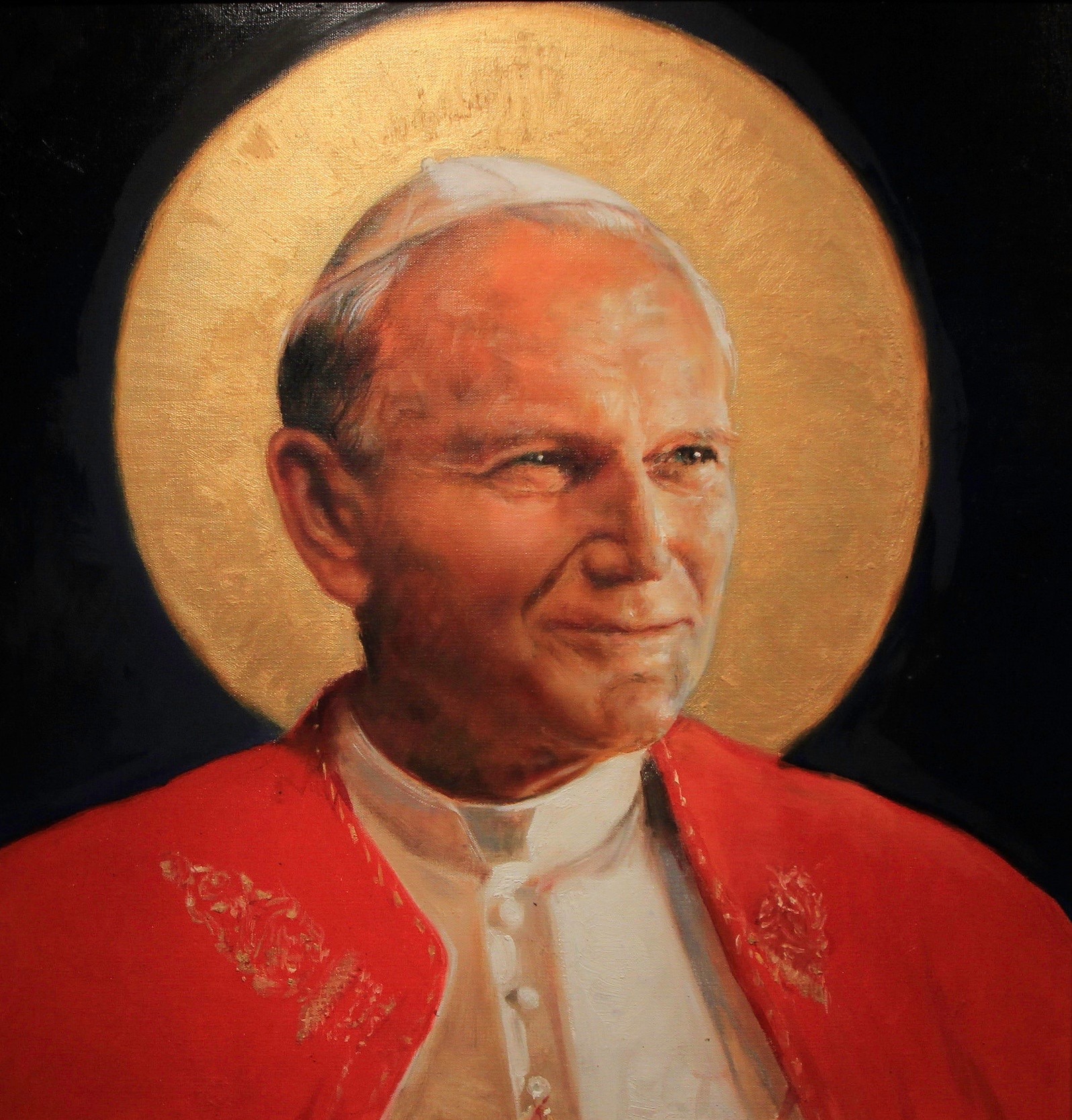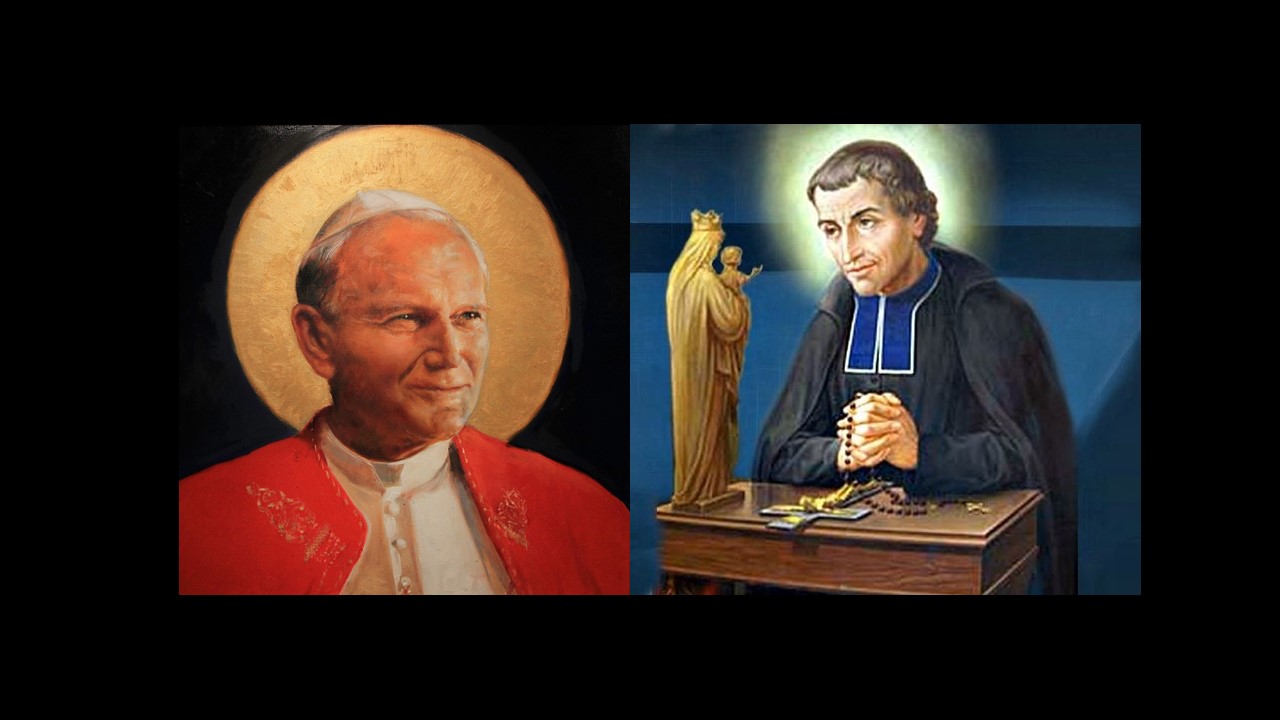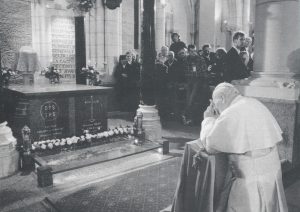Pope John Paul II At the Tomb of St. Louis de Montfort
Saint Pope John Paul II
On the 19th of September 1996, at the start of his visit to France to commemorate the l500th anniversary of the Baptism of Clovis, King of the Franks, Pope John Paul II made a “private” visit to the tomb of St. Louis Marie de Montfort in the village of Saint- Laurent-sur-Sévre, in the Vendée region. He wished to make a pilgrimage to the tomb of this saint whose writings (he acknowledges), have had a great influence on his own spiritual life.
The following is the text of the homily he preached to the many Religious gathered there during the Solemn Vespers in which he participated.
Dear Brothers and Sisters,
O n the occasion of this pilgrimage to the tomb of St. Louis Grignion de Montfort and Blessed Marie Louise de Jesus it gives me great joy to celebrate the evening liturgical office with the religious who have come from all over the West of France. Many thanks to Bishop Francois Garnier, Ordinary of the Diocese of Lucon, and the Superiors of the Montfortian family, for their warm welcome extended in your own name and that of the diocesan community represented here. To all I extend my most affectionate greetings!
The reading of the Letter to the Romans, which we just heard, speaks to us of humanity’s vocation in Christ. In Christ we are, from all eternity, known and called to be conformed to the image of Him Who is “the first born of many brothers” (Rm 8:29). In Him, true God and true Man, the Father shows us the meaning of our vocation. Between the eternal knowledge of man which the Father has in the Word, and the call He addresses to man in time, there exists a strong bond. Christ knows that His coming into the world and, in particular, His suffering, His death and resurrection, should reveal to men their own vocation, willed by the Father in the mystery of the Incarnation of His Son. Realizing this, Christ at the end of His earthly mission addresses this exhortation to His Apostles: “Go, therefore, and make disciples of all the nations, baptizing them in the name of the Father, Son, and of the Holy Spirit, teaching them to observe all that I have commanded you, and behold, I am with you until the end of the age” (Matt. 28: 19-20).
From age to age, the successors of the Apostles and countless disciples have worked to fulfill this mission entrusted to them by the Lord. In this region St. Louis Marie Grignion de Montfort was one of the Lord’s most remarkable disciples. I am happy to begin my pilgrimage on French soil under the patronage of this outstanding saint. You know that I am very indebted to him and to his Treatise. Today, because of my pastoral visit has for the most as its theme the sacrament of baptism, I would like to highlight the fact that, in the mind of St. Louis, the whole spiritual life flows directly from the sacrament of holy baptism as is shown by an important passage of the Act of Consecration to Jesus by the hands of Mary, written in his own precise wording. In the middle of the Act of Consecration we find these words: “I – here, one states one’s name, for example, Louis-Marie or John Paul or Charles – unfaithful sinner, I renew and ratify today in your hands (the hands of Mary), the promises of my baptism: I renounce forever Satan, his pomps and works, and I give myself entirely to Jesus Christ, Incarnate Wisdom to carry my cross after Him all the days of my life . . .” (The Love of the Eternal Wisdom, #225).
The reminder of the promises of baptism is clear. During the baptismal liturgy, each of us was asked: “Do you renounce Satan and all his pomps and works?” Then: “Do you believe?” The very act of baptism is a choice of God, a choice for Christ, a choice of a life rooted in the grace of the Holy Spirit. The choice is, so to speak, the victory over original sin. The sacramental grace of baptism wipes out original sin, but the one who receives it must also renounce sin, in order to correspond to the grace of justification, offered to him in his life of faith in Jesus Christ. In the sacrament of Baptism there is a certain return to our primal origin when the choice was for good, not evil; for salvation, not rejection. If Grignion de Montfort puts these ideas in his True Devotion to the Mother of God, he does so because Mary, by the will of God, from the moment of her Immaculate Conception, had been destined in the plan of God to over-come sin by the justification she received by the grace of Christ.
At the beginning of this pilgrimage which will also bring me to Rheims for the 1500th anniversary of the baptism of-Clovis, it is good for us to consider from a Marian point of view the essential meaning of the sacrament of baptism.
In speaking to you, men and women religious, I would like to reiterate that “In the Church’s tradition, religious profession is considered a unique and fruitful deepening of the baptismal consecration in the sense that, by it, an intimate union with Christ (. . .) grows” (Vita Consecrata #30). You are called to go further, thanks to “a special gift of the Holy Spirit.” (Ibid.}, because you choose to practice, in a radical way, the evangelical counsels to follow Christ; and you take as your model the Virgin Mary, “sublime example of perfect consecration by her total gift of self to God” (Ibid. #28).
The demands of your vows may appear to your contemporaries difficult to understand and almost impossible to live up to. Do not let this upset you! To tell the truth, faithful and humble as you are, you give a witness sorely needed. Your free choice of celibacy, of the sacrifice of temporal goods and of obedience, answers the questions that many have about their own values. To sum it up, your practice of the evangelical counsels has no other meaning than to witness with an undivided heart to the infinite love of God, which is man’s greatest good. Your life also witnesses to the freedom which results from filial, not servile, dependence on God (cf. Vita Consecrata #21). Your vocation is to be living signs of God in the world by being mirrors of the image of His Son” (Rom. 8, 29).

Praying at the Tomb of St. Louis de Montfort and Blessed Marie Louise of Jesus
May the maternal love of the Mother of Our Lord guide you each day on your journey, following Jesus to render all honor and glory to the Father in the unity of the Holy Spirit and perfect us so that we can be a fragrant odour of eternal life for all
You who have come here to represent the religious of the rest of France are a microcosm of the diverse charisms which inspire your commitment within the contemplative or apostolic life, in secular institutes or religious orders.
I know that many of you are disturbed by the current losses of vocations and the aging of many of your members. This is a mysterious call to share in the sufferings of the Cross. But this trial is not the end. I want to stress here all the admiration that the fidelity, zeal, and creativity of religious men and women, even those who are aged, have aroused in the faithful. The work accomplished by the numerous Congregations founded in your region has been considerable. This work includes the reconstruction of the Church in the last century, the care of the sick, education, and pastoral work. It is true that the Gospel must be proclaimed in the language of the people. Put to work today with enthusiasm, Sisters and Brothers, the charisms of your founders. Continue to write the living history of your Congregations!
I would also like to acknowledge here the many missionaries who have left the West of France to evangelize the world, as well as those who at present are still working in many foreign lands. And I may say that there is always a great need for religious in the young Churches in the Third World.
Your witness and your apostolate are a great wealth for the local communities. Don’t hesitate to share what you have learned through experience, the meaning of your spirituality and the charisms of your various religious Congregations, as well as your own joy in serving. Whether for the diocesan clergy or the laity, the presence of religious remains a precious stimulant and often enough an indispensable aid in evangelization.
Attentive to the needs of our present time and faithful to the insights of the founders, religious make it possible for the young, I am convinced, to hear the Lord’s call to serve Him by the total gift of self.
The offering of your lives has a hidden fruitfulness, whether in the humdrum of daily living, or in the pain of bearing the cross of suffering, I am thinking of the sacrifice of many religious who, for the sake of the Gospel and through faithfulness to the Church, serve here at home or in foreign lands. I recall with deep emotion the seven Trappist brothers of L’Atlas, remembering that three of them had been monks of Bellefontaine. Continuing in the footsteps of other apostolic men and women, they gave their lives as pure and disinterested witnesses of the love of Christ for the sake of their brothers whom they wished only to serve. Let us continue to pray so that their sacrifice may become a source of light and that their presence before the Lord will support their brothers and sisters today.
I would like to end by repeating in Grignion de Montfort’s words how much your life finds its true meaning in the person of Christ: “God has laid no other foundation for our salvation, perfection, glory than Jesus Christ” (True Devotion #61). Praying with him, let us call upon the Lord with the Blessed Virgin: “Lord, You are always with Mary and Mary is always with you” (Ibid. #63). May the maternal love of the Mother of Our Lord guide you each day on your journey, following Jesus to “render all honor and glory to the Father in the unity of the Holy Spirit and perfect us so that we can be a fragrant odour of eternal life for all” (cf, Ibid. #61).




